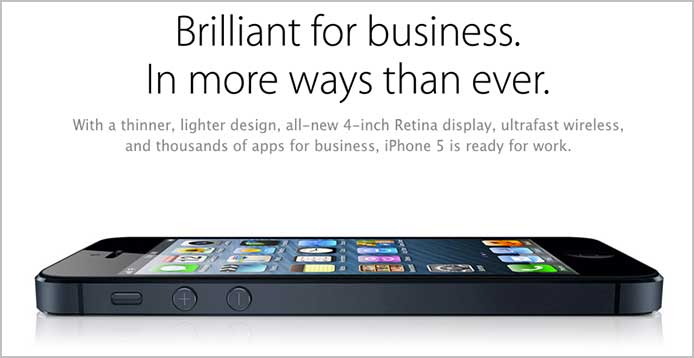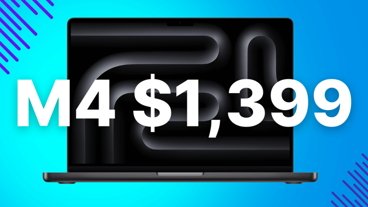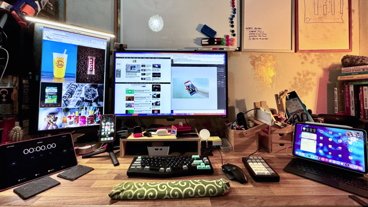According to a study released by IDC, Apple's iPhone and handsets operating Google's Android operating system will combine to overtake the share of enterprise customers using RIM's BlackBerry, which for years has been the stalwart OS of that segment.
In its latest findings, IDC forecasts employee liable Android shipments will hit 87.7 million units, while iPhone shipments are pegged at 37.1 million, reports Computerworld. This is in addition to corporate-furnished sales, which stand at 15.1 million and 31.1 million for Android and iPhone, respectively.
The combined figures far outpace what is expected of RIM's BlackBerry, which is seen as reaching 5.2 million employee liable shipments and 14.8 million from consumers. This lack in interest from the mainstream customer base is hurting RIM's attempts to stay on top of the enterprise heap. In 2011, BlackBerry led in corporate liable smartphone shipments in 2011 with 22.4 million.
"BlackBerry continues to be the gold standard for security," the IDC report said, but noted that a reduced interest in the platform from consumers and developers "hinders its viability going forward."
Projections show that Apple's iPhone will become the top corporate liable smartphone and will reach 68.9 million shipments in 2016.
Businesses are buying iPhones "in droves," IDC said, pointing out that Apple's well-instituted iOS platform and tight security are "win-win" for enterprise customers. One concern, however, is Apple's strict app submission and curation policies, which the firm said"can create frustration" with enterprise customers.
On the other hand, while Android has a bevy of developers and the number of employee liable devices far outstrip any other platform, the fragmented operating system has "more gaps in security than many organizations are comfortable with," which will likely keep it behind the iPhone until those issues are resolved.
The trend toward iOS is becoming more palpable and long-standing service and product providers are beginning to take notice. Most recently, a report noted that Microsoft will initiate a licensing rate hike on Dec. 1, tacking on a 15 percent premium to user client-access licenses. The move is thought to take advantage of the burgeoning bring-your-own-device movement, which is arguably led by Apple's iPad and iPhone, but also applies to Android devices.
RIM is close to launching its latest BlackBerry 10 OS and corresponding devices, however the attempt might be too little, too late as an increasing number of companies and government agencies are switching to iPhone. The National Transportation Safety Board became the latest U.S. agency to ditch BlackBerry for Apple's offerings, saying the RIM devices have "been failing both at inopportune times and at an unacceptable rate." Previously, the U.S. Immigration and Customs Enforcement agency announced it would be purchasing more than 17,600 iPhones for its employees, while NOAA, the GSA will all be introducing similar plans.
 Mikey Campbell
Mikey Campbell







-m.jpg)






 Christine McKee
Christine McKee
 Malcolm Owen
Malcolm Owen

 Sponsored Content
Sponsored Content

 Amber Neely
Amber Neely











14 Comments
Agreed. A Rolex in a sea of Timex's...
It'll be interesting to see RIM's OS offering. It will have to be a "knock your socks off" release.
The problem with knock your socks off is that it will be incompatible with prior releases. BES and UI were the two stickiness points for enterprises. the BES team already jumped ship and to maintain corporate relevancy has been supporting iOS since April... After corporate testing, it's now a likely reason for iOS (and in some cases android) adoption in corporate IT depts. The UI issue will always be one where people have 'niched' a device to their fingers... I know people who can touch type on a BB keyboard at 40 words/min... and they won't switch. Lot's of people just need corporate messaging... "give me a link to my corporate email account, and I'm good to go...." Others are luddites and tend to claim 'Smartphones are for dumb people' which really means their excel spreadsheet macros and VB add-on have them locked into a laptop with cellular, therefore a simple BB phone is all they need. If MS/Nokia hadn't screwed the pooch so bad in their WP8 release, I'd be saying RIMM is dead. But there is still a chance for 3rd place in the mobile wars, and 3rd place could be viable. for a company as small as RIMM.
If MS/Nokia hadn't screwed the pooch so bad in their WP8 release, I'd be saying RIMM is dead. But there is still a chance for 3rd place in the mobile wars, and 3rd place could be viable. for a company as small as RIMM.
Unfortunately, Microsoft still has a huge war chest, while RIM's cupboards are looking pretty bare. It's entirely possible that MS could spend their way into acceptance, even if we have to wait for WP9 or WP10.
Agreed that there's still room for a third. Nice analysis.
I think Blackberry 10 has some interesting features :D